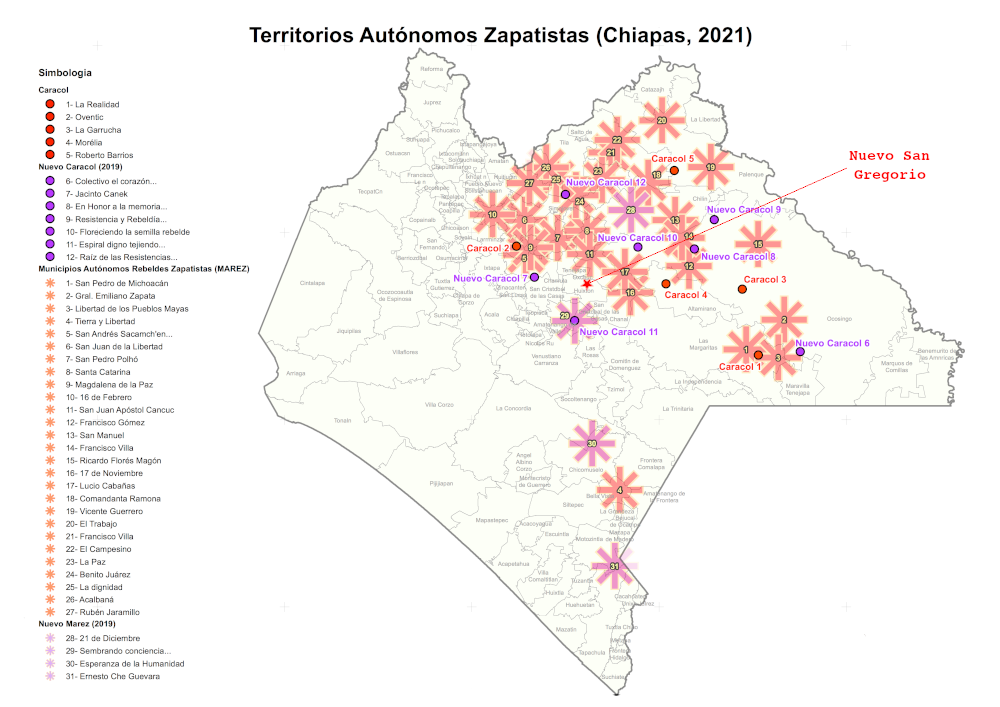The Caracoles is a way to organize self-government in the five Zapatista controlled zones in the state of Chiapas, they were born on August 8, 2003 in substitution of the Aguascalientes. This change marks a new marks a new stage in the political development of the EZLN that can be analyzed from different angles.
The "caracol" has been a constant representation for the indigenous peoples of the Mexican southeast since time immemorial. The ancient Maya used it not only as a symbol to represent the zero 0, they used it to make music, to call the population to concentrate or to perform religious ceremonies. Today it still used in the area to call community assemblies.
The pu'y or Caracol represents the collective heart where knowledge comes from, symbolizes the way in which the heart (i.e., the community) expresses itself to the world. to the world. The Zapatistas call this dialectic way of relating to the external "life". called "life", which would be the form in which the internal heart manages to communicate with the other, understanding the with the other, understanding communication in its double channel, speaking and listening. Thus, the snail represents the call to dialogue.
Ja ma' 'ay ya'tel kujtiki, an idea that Lenkersdorf (German Language) translates in his Tojolabal-Spanish dictionary as "the authorities elected by us are commanded by us", and expresses one of the basic premises in the indigenous political tradition that the Zapatistas have taken up to organize themselves within the Caracoles.
In the indigenous cosmovision, the capacity of the rulers to listen and to decide or think from the "we thinking from the "we" is inseparable from the heart. Thus, to be a good ruler is to to have the capacity to develop an empathetic relationship with the problems of the community in order to community in order to make decisions from the inside out, from the heart of the we. us, what the Zapatistas call "to command by obeying".
Ancestrally, this organizational form of "commanding by obeying" has had as its objective to achieve an equitable to achieve an equitable distribution of power and to promote the active participation of the people. In this way, it seeks to avoid the concentration of command power in the hands of one group. Thus, decisions are not delegated to the authorities, but are directly dependent on the people's decision, participation being not only a political right but also an obligation linked to a sense of responsibility to the community.
In this sense, the main task of the indigenous authorities would be to listen to the demands of the population and act according to them, i.e., to exercise command in a process of "walking the in a process of "walking the walk by asking", leaving behind the Western political vision of representative democracy that unilaterally exercises power.
How are Caracoles Organized?
The self-government exercised within the rebel zones is organized by the communities at the local level, by groups of communities at the regional level and by a group of regions at the zone level, so that each Caracol is in charge of one of the five zones in which the recovered territories are grouped.
The thirty Zapatista Autonomous Rebel Municipalities (known by the Zapatistas by the acronym MAREZ) are declared "existing" with the rupture of the military siege on December 19, 1994. With this begins the process of building Zapatista autonomy driven by the grassroots communities. Currently, the Autonomous Municipalities exercise their right to self-determination independently.
Now, the function of the Good Government Boards, constituted on August 9, 2003, is to counteract the imbalance in the development of the autonomous municipalities and communities, mediate in conflicts that may arise, deal with complaints of all kinds, oversee the implementation of community projects in the MAREZ and promote support for community projects, monitor compliance with the laws, and link the EZLN and the CCRI with the civilian Zapatista support bases.
Each of the constituent parts of the territory or rebel government receives a name assigned by its inhabitants through an assembly consensus.

Megathreads and spaces to hang out:
- ❤️ Come listen to music and Watch movies with your fellow Hexbears nerd, in Cy.tube
- 💖 Come talk in the New Weekly Queer thread
- 💛 Read and talk about a current topics in the News Megathread
- ⭐️ October Movie Nominations ⭐️
reminders:
- 💚 You nerds can join specific comms to see posts about all sorts of topics
- 💙 Hexbear’s algorithm prioritizes comments over upbears
- 💜 Sorting by new you nerd
- 🌈 If you ever want to make your own megathread, you can reserve a spot here nerd
- 🐶 Join the unofficial Hexbear-adjacent Mastodon instance toots.matapacos.dog
Links To Resources (Aid and Theory):
Aid:
Theory:


Not weird. The self is a collection of several different things. I am a meat puppet that contains a brain which houses a collection of thoughts and ideas that my consciousness analyses. Each of these things is separate but completely dependant on each other. Saying "we" is just a sign that you understand these separations.